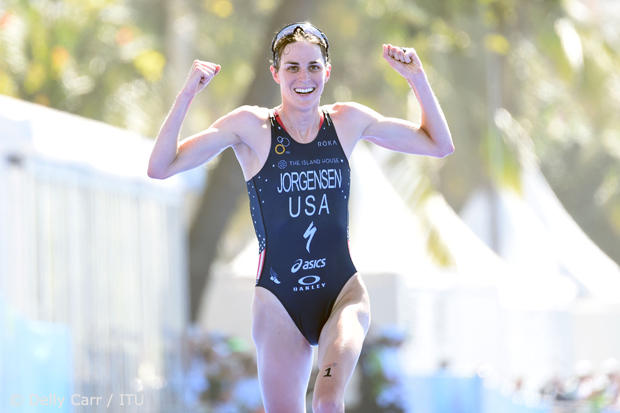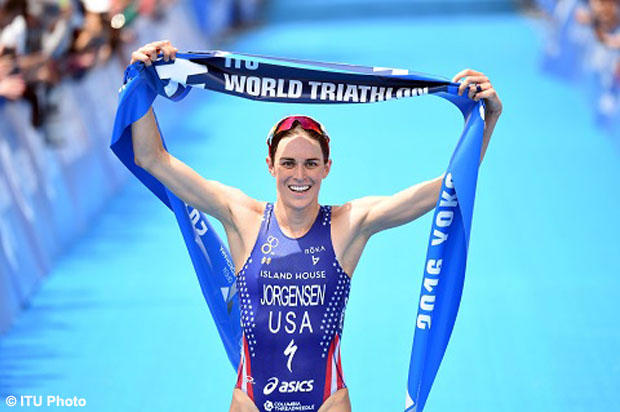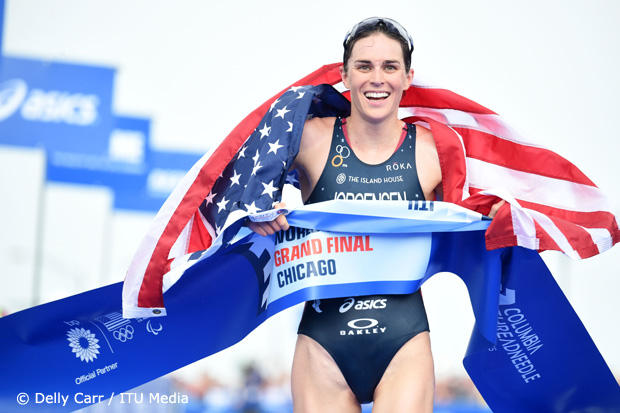The Other Woman

Typically, USA Triathlon politics result in glazed over eyes. Response rates to surveys concerning USAT governance issues are typically in the low single digits. As with most bureaucratic arcana, it's stuff that no one really cares about until they care a lot. The Olympic qualifying/selection process has a lot of complexities, since countries themselves must vie for between one and three spots based on a international ranking system which is set by the ITU. This is important because athletes who "earn" a spot for their country, according to the ITU, don't necessarily receive that slot via their own country's selection procedure. This is a topic of regular debate, highlighted prior to the London Olympics when neither Jarrod Shoemaker nor Matt Charbot, the two highest ranked Americans, ended up making the team. To a certain extent, this approach makes some sense. The ITU country ranking is largely based around consistency of performance, with the exception of top performances at so called Continental Championships (winning Pan-Am games, for example, guarantees a country a slot, though the athlete who earns the slot isn't necessarily entitled to take it). On the other hand, most national selection procedures more closely mimic the Games themselves and reward athletes who can perform well at a specific event. The complete breakdown of the ITU's procedure is available HERE.
Due to pretty overwhelmingly dominant performances by the top-three ranked women – Gwen Jorgensen, Sarah True, and Katie Zaferes – the US has three slots. It's worth noting that the US is so strong on the women's side that even if any of these athletes were eliminated from the rankings, with six athletes in the top-25 on the ITU's Olympic rankings being American, the US would still have three spots for the Olympics. The US has another nine women ranked between 60th and 139th who fall within the required "Top-140" to be eligible for the Olympic Games.
So far, two of the slots on the women's side are taken. Both Gwen Jorgensen and Sarah True earned their slots automatically by being the top two American finishers within the top-8 overall at the Rio Test Event last summer. According to USAT's selection policy found HERE, there were three races (sort of*) where an athlete could qualify for the team: Rio Test Event, 2015 ITU WTS Grand Final in Chicago, and 2016 WTS Yokohama*. The asterisks in these cases are there as follows. Chicago only offered the chance for automatic qualification *IF* two athletes didn't automatically qualify at the Rio Test Event. That happened, so no performance at Chicago – even winning – would have automatically qualified an athlete. The asterisk on the Yokohama race comes from an unlikely-but-possible clause that stipulated that another race (the WTS race in Leeds) would be used if the Yokohama course ended up being modified such that it no longer really counted as an Olympic-distance event, defined as having the swim, bike, or run shortened by more than 25%; that didn't happen, so a podium (top-3) finish in Yokohama was the last way to automatically punch your ticket to Rio as a US woman. However, that also didn't happen, and that brings us up to today.
With one slot still open, the process goes to a selection committee. This is the really complicated part. The selection committee is a group of four people, selected by the group of seven people who wrote the selection criteria linked above. That group of four, once selected, must then be confirmed by the 12 members of the USAT board of directors. Once confirmed, that group then makes the selection(s). Confused? You should be. What's especially confusing is that it's not clear whether there is a separate group of four selectors for the men and the women. The selection document outlines a single selection committee made up of: the USAT High Performance General Manager, two (2) Athlete Representatives, and one Independent Representative (Coach, Sport Science). The document does NOT specify if a separate committee is required for the men and the women. This is important because according to Zaferes (via Twitter and a story on NBC), the committee that will determine her fate has not yet been selected.
On the men's side, no athletes met the the automatic qualification criteria, so all three slots went to the "Objective Ranking System." As a result, these athletes have already been named: Joe Maloy, Greg Billington, and Ben Kanute were named to the team shortly after the race in Yokohama. The Objective Ranking System is used, "After consideration of Domestique Selection, any remaining positions on the Team will be filled through the following Objective Ranking System." But, "If there are any remaining spots on the Team following 1.3.1, up
to one (1) spot may, but not necessarily, be filled by domestique selection (see Section 2 below). If the Elite Athlete Selection Committee chooses not to fill the spot with a domestique after 1.3.1, the opportunity to reconsider Domestique Selection will be available after each individual Athlete added to Team through 1.3.3. [Objective Ranking System]." This begs an important question. No men received an automatic slot, so technically, there were slots remaining after the automatic qualification procedure was done. According to the wording of the selection document, that means that the Selection Committee would have to be formed and then decide that they weren't going to select a domestique. Now, clearly, on the men's side, the committee would have to opt not to select a domestique, since no one automatically qualified and showed themselves to be "gold medal capable." But the point is, the committee still had to make that foregone conclusion. So was a group of four selected by the seven and then confirmed by the 12? Did they then make that obvious decision? If not, why not? And if so, why can't that committee be used for the women? I'm going to go ahead and say it's contained somewhere in the "penumbra."
Credit for the above argument goes to lawyer Jay Jackson, writing on the USAT Southwest Facebook page. Jackson wrote: Men's selection was based totally on points and that decision was made prior to the race. It had to be because they so quickly announced the participants. But, who made that decision? I am also sure people were told that since there were no automatic qualifiers that the domestique process did not apply. But, that is not what the USAT document actually says.
Regardless of the formation of a selection committee, the process on the women's side is more complex because the US in in the fortunate position of having "gold medal capable athletes," as defined by the automatic selection process. What this means is that any athlete who automatically qualified is, in the opinion of the drafting committee (who wrote that document) capable of winning in Rio. As a result of having potential gold medalists, the selection committee is able to fill an unfilled spot with an athlete who can serve in the role of "domestique." The idea here is that if a medal contender has a bad swim, they can be shepherded on the bike without having to ride solo. Or, if there's a breakaway, the domestique can chase it down to control the race, which is what Colin Jenkins (CAN), Shane Reed (NZL), and others did in Beijing '08. Colin repeatedly chased down attempted breakaways by Alistair Brownlee. Canada, New Zealand, Germany, and Spain all sent athletes to serve as domestiques, and those countries finished 1-4 overall. Whether or not domestiques were "necessary" remains a topic of debate, but the strategy seemed prudent based on the tough course in Beijing, a course that bears a lot of similarity to the hilly course in Rio. But in most (maybe all) cases, the use of domestiques was piloted at other races, notably at the similarly-challenging-on-the-bike course of the World Championships in Vancouver. This testing of domestiques is important because, so far, USAT has not tested a domestique for either Sarah or Gwen. And the selection document states explicitly that domestiques are, among other requirements, athletes who have, "Demonstrated knowledge of cycling team tactics."
The only athlete whom you can argue, plausibly, that fits the all three criteria listed, especially the "demonstrated knowledge" one, is Sarah Haskins. But Sarah is ineligible for Rio as she is not, currently, ranked in the top-140 on the ITU list. No other athlete in the top-140 has "demonstrated a knowledge of cycling team tactics." There are a lot of very talented female triathletes on the US side, but none of them has a history in competitive road racing or in a domestique role within the sport of triathlon.
This brings up another comment that Jay Jackson wrote. Talking about Katie Zaferes, Jackson wrote, "Also, the guidelines say that an athlete is gold medal capable if they finish in the top 8 at the test event. [Katie Zaferes] did. She finished sixth. Since she is gold medal capable, based on the wording of the guidelines, she has a real good argument she has already qualified and [the] domestique procedures are not triggered." It's clear that, according to USAT's own policy, Katie Zaferes is considered "gold medal capable." She met (part of) the Automatic Qualification criteria when she finished 6th at the Rio Test Event. Unfortunately for her, two other women finished ahead of her.
The US has three athletes who, both according to USAT's own selection document and the athletes' larger history of race results, have proven that they are "gold medal capable." The US does not have any eligible athlete who has, according to that same selection document, shown they are capable of performing as a domestique. As a result, the procedure should, as on the men's side, obviously go to the Objective Ranking System. And the Objective Ranking System dictates that Katie Zaferes has that third spot.
Are there athletes who might admirably fill the role of domestique? Of course. And might they make a positive impact on race day? Of course. But the selection criteria was written to be objective and clear. But, so far, execution of those criteria has been anything but. USAT's board has an obligation to listen to its membership. That means many of you. Please take the time to share your thoughts and to encourage USAT to follow its own stated procedures by contacting USAT here.
The US women have a real chance to sweep the medals in Rio. USAT should capitalize on that and send the three women that they defined as "gold medal capable." That means selecting Katie Zaferes with the third slot.
[Ed. note: Jordan Rapp is coached by Joel Filliol, who also coaches Katie Zaferes.]







Start the discussion at forum.slowtwitch.com